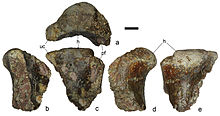Aralazhdarcho is a genus of azhdarchid pterosaur that lived during the Santonian to the early Campanian ages of the Late Cretaceous period in what is now Kazakhstan. The type and only known species is Aralazhdarcho bostobensis, named and described by Russian paleontologist Alexander Averianov. Its remains were found in the Bostobe Formation of Kazakhstan. The generic name combines the Aral Sea and the related genus Azhdarcho, while the specific name refers to its origin from the Bostobe Formation.
| Aralazhdarcho Temporal range:
| |
|---|---|

| |
| Fragment of a left humerus viewed from various angles | |
| Scientific classification | |
| Domain: | Eukaryota |
| Kingdom: | Animalia |
| Phylum: | Chordata |
| Order: | †Pterosauria |
| Suborder: | †Pterodactyloidea |
| Family: | †Azhdarchidae |
| Genus: | †Aralazhdarcho Averianov, 2007 |
| Species: | †A. bostobensis
|
| Binomial name | |
| †Aralazhdarcho bostobensis Averianov, 2007
| |
| Synonyms[1] | |
| |
Due to its toothless anatomy and the geological age of its fossil remains, Aralazhdarcho was assigned to the family Azhdarchidae. Phylogenetic analyses would often recover it in a clade alongside Phosphatodraco from Morocco. The pterosaur genus Samrukia has been speculated to be a junior synonym of Aralazhdarcho.
Etymology
editAralazhdarcho bostobensis as a genus and type species was named in 2007 by Russian paleontologist Alexander Averianov.[2] However, the holotype specimen had already been described back in 2004.[3] The generic name Aralazhdarcho is derived from the Aral Sea and the related genus Azhdarcho, while the specific name bostobensis refers to its provenance from the Bostobe Formation.[2]
Description
editAralazhdarcho is based on holotype ZIN PH, no. 9/43, consisting of the anterior end of a neck vertebra, probably the fifth or sixth. Several paratypes have also been referred: a jugal, a toothless lower jaw fragment, centra from vertebrae, the distal end of a scapula, the proximal end of a second phalanx of the left wing finger and the proximal end of a left femur, of which, however, the head has broken off. The remains were found at the Shakh-Shakh locality of Kazakhstan.[2] The species Samrukia nessovi, described separately from a partial lower jaw from the same formation, may have possibly been a junior synonym of Aralazhdarcho.[4]
Classification
editIn its description by Averianov, Aralazhdarcho was assigned to the family Azhdarchidae, in view of its lack of teeth and geological age. Averianov presumed that it presented a more southern form of azhdarchid as opposed to the contemporary genus Bogolubovia (now assigned as a pteranodontid instead of an azhdarchid[5]), which was found more northern regions of Kazakhstan.[2] The cladograms below show two different phylogenetic analyses that have recovered Aralazhdarcho within Azhdarchidae. The first one is by American paleontologist Brian Andres, in which he found Aralazhdarcho within the subfamily Quetzalcoatlinae, in a basal (primitive) clade with Phosphatodraco from Morocco.[6] This close relationship between both azhdarchids would later be demostrated again in a 2023 study by paleontologist Rodrigo Pêgas and colleagues, finding them in a trichotomy with Wellnhopterus from Texas. However, contrary to Andres in 2021, Pêgas and colleagues recovered Aralazhdarcho outside Quetzalcoatlinae in a more basal position within Azhdarchidae.[7]
|
Cladogram by Andres (2021). |
Cladogram by Pêgas and colleagues (2023).
|
See also
editReferences
edit- ^ Averianov, Alexander; Dyke, Gareth; Danilov, Igor; Skutschas, Pavel (2015-02-20). "The paleoenvironments of azhdarchid pterosaurs localities in the Late Cretaceous of Kazakhstan". ZooKeys (483): 59–80. Bibcode:2015ZooK..483...59A. doi:10.3897/zookeys.483.9058. ISSN 1313-2970. PMC 4351447. PMID 25755624.
- ^ a b c d Averianov, A.O. (2007). "New records of azhdarchids (Pterosauria, Azhdarchidae) from the late Cretaceous of Russia, Kazakhstan, and Central Asia" (PDF). Paleontological Journal. 41 (2): 189–197. Bibcode:2007PalJ...41..189A. doi:10.1134/S0031030107020098. S2CID 128637719.
- ^ Averianov, A.O. (2004). "New Data on Cretaceous Flying Reptiles (Pterosauria) of Russia, Kazakhstan, and Kyrgyzstan". Paleontol. Zh. (4): 73–83. (Paleontol. J. 38 (4), 426–436)
- ^ Averianov, Alexander; Dyke, Gareth; Danilov, Igor; Skutschas, Pavel (2015-02-20). "The paleoenvironments of azhdarchid pterosaurs localities in the Late Cretaceous of Kazakhstan". ZooKeys (483): 59–80. Bibcode:2015ZooK..483...59A. doi:10.3897/zookeys.483.9058. ISSN 1313-2970. PMC 4351447. PMID 25755624.
- ^ Averianov AO, Kurin AS (2022). "A new specimen of pteranodontid pterosaur Bogolubovia orientalis from the Upper Cretaceous of Penza Province, Russia". Historical Biology: An International Journal of Paleobiology. doi:10.1080/08912963.2022.2087522.
- ^ Andres, Brian (2021). "Phylogenetic systematics of Quetzalcoatlus Lawson 1975 (Pterodactyloidea:Azhdarchoidea)". Journal of Vertebrate Paleontology. 41 (sup1): 203–217. Bibcode:2021JVPal..41S.203A. doi:10.1080/02724634.2020.1801703. S2CID 245078533.
- ^ Pêgas, R. V.; Zhoi, X.; Jin, X.; Wang, K.; Ma, W. (2023). "A taxonomic revision of the Sinopterus complex (Pterosauria, Tapejaridae) from the Early Cretaceous Jehol Biota, with the new genus Huaxiadraco". PeerJ. 11. e14829. doi:10.7717/peerj.14829. PMC 9922500.